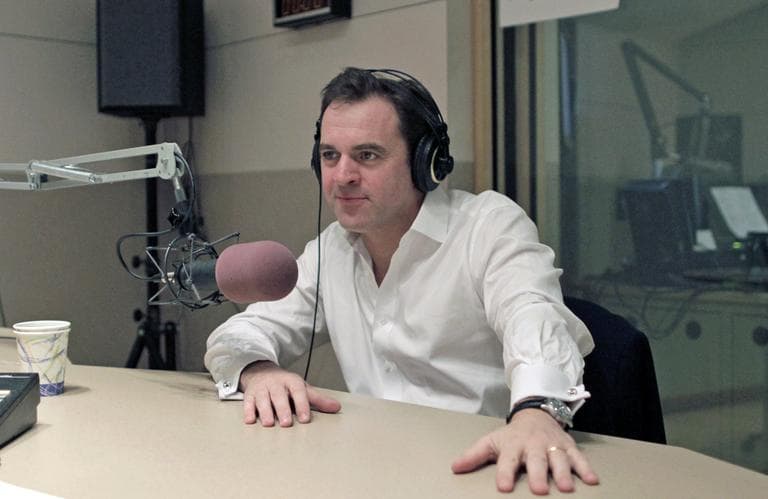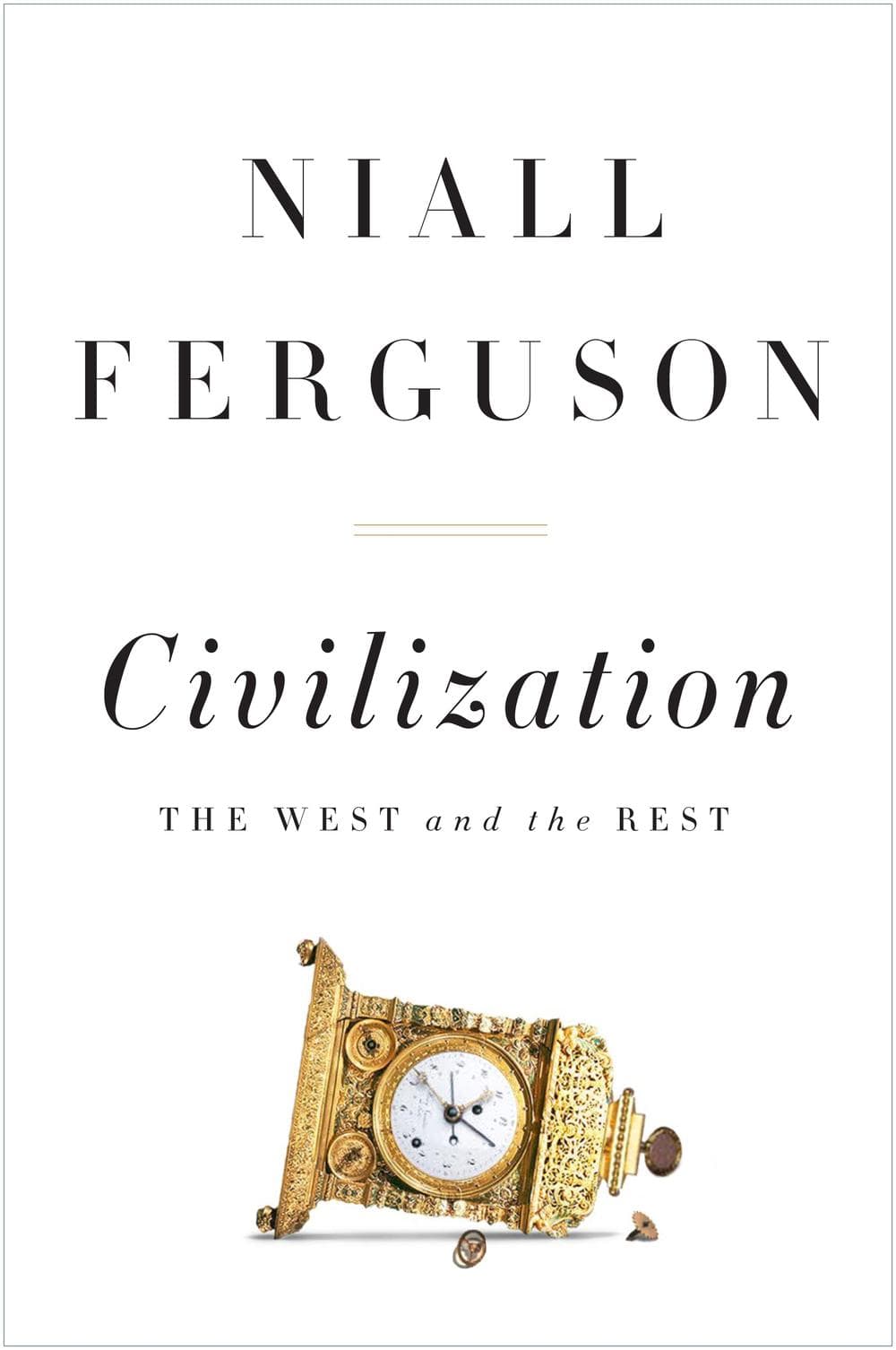Advertisement
The West In Decline?
ResumeThe West was great. But what about now? Debt. Fear. The Euro. Is the West out of gas? Is our time up? Big-time historian Niall Ferguson gives us his take.

For five hundred years, the ascendancy of the West has driven world events. Sometimes brutally. Sometimes beautifully. But it’s been the West on top. Now, as Europe shakes, the U.S. struggles, and China and India rise, historian Niall Ferguson is asking whether the long era of Western ascendancy is over.
Whether we’re living through a long decline – or could see a sudden collapse. Maybe soon. Avoiding that means a cultural and institutional “reboot” says Ferguson, to revive the sources of Western strength. Our “killer apps.”
This hour, On Point: Niall Ferguson on the fate of the West.
-Tom Ashbrook
Guests
Niall Ferguson, Laurence A. Tisch Professor of History at Harvard University and author of Civilization: The West and the Rest.
Highlights
Anyone worried about the gradual decline of the west might to be looking through rose-colored glasses. The financial crisis gripping Europe – coupled with the “powder keg” of new, unassimilated immigrant communities – could help trigger a global power shift from West to East, contends Harvard historian Niall Ferguson.

“When you look at complex organizations, whether it be empires or corporations, they are much more likely to collapse very suddenly,” Ferguson said. “As we look at our own civilization, we should steer clear of the assumption that a gentile decline is all we have to worry about. We should be much more worried about collapse, than decline.”
Historically when the West encountered other civilizations, they crumbledswiftly, Ferguson noted, pointing to the Inca and Aztec empires, as well as the Ming dynasty in China. The Roman Empire, for its part, fell apart quite quickly in the early 5th century, “in the span of a few decades,” he said.
The current financial crisis paralyzing Europe is a case in point, the historian said. “The project to integrate Europe into a single monetary union is, in fact, unraveling at a terrifying speed.”
More worrying, the financial crisis may be only the trigger for something worse. Ferguson called unassimilated immigrant communities in Europe “powder kegs.”
“When economic shocks hit multiethnic societies which haven’t been well integrated, look out,” he said. “Those people who have created enclaves of multiculturalism, i.e. of Sharia law, in parts of Western Europe, have created, I think, a very unstable situation.”
“If the rule of law is different in certain parts of a country, you’re already in dangerous territory. I think we need to bear in mind that the potential for ethnic conflict in times of economic crisis has not gone away,” said Ferguson. “And that the multiethnic cities that have been created in the Western world are not necessarily going to remain stable if economic growth remains as low as we’re currently seeing.”
From Tom's Reading List
The Guardian "It has been an intellectual spat of some savagery, so far largely confined to the refined pages of one of Britain's most respected literary magazines."
TED "Over the past few centuries, Western cultures have been very good at creating general prosperity for themselves. Historian Niall Ferguson asks: Why the West, and less so the rest? He suggests half a dozen big ideas from Western culture — call them the 6 killer apps — that promote wealth, stability and innovation. And in this new century, he says, these apps are all shareable."
Newsweek "There’s another problem. Just like the populists of a century ago, the Teapopulists are drawn compulsively to disastrous presidential wannabes. I never asked you what you thought of Mitt Romney, Ted."
Excerpt
In this book I want to show that what distinguished the West from the Rest – the mainsprings of global power – were six identifiably novel complexes of institutions and associated ideas and behaviors. For the sake of simplicity, I summarize them under six headings:
1. Competition
2. Science
3. Property rights
4. Medicine
5. The consumer society
6. The work ethic
To use the language of today’s computerized, synchronized world, these were the six killer applications – the killer apps – that allowed a minority of mankind originating on the western edge of Eurasia to dominate the world for the better part of 500 years.
Now, before you indignantly write to me objecting that I have missed out some crucial aspect of Western ascendancy, such as capitalism or freedom or democracy (or for that matter guns, germs and steel), please read the following brief definitions:
1. Competition – a decentralization of both political and
economic life, which created the launch-pad for both
nation-states and capitalism
2. Science – a way of studying, understanding and ultimately
changing the natural world, which gave the West (among other
things) a major military advantage over the Rest
3. Property rights – the rule of law as a means of protecting private
owners and peacefully resolving disputes between them, which
formed the basis for the most stable form of representative
government
4. Medicine – a branch of science that allowed a major
improvement in health and life expectancy, beginning in Western
societies, but also in their colonies
5. The consumer society – a mode of material living in which the
production and purchase of clothing and other consumer goods
play a central economic role, and without which the Industrial
Revolution would have been unsustainable
6. The work ethic – a moral framework and mode of activity
derivable from (among other sources) Protestant Christianity,
which provides the glue for the dynamic and potentially unstable
society created by apps 1 to 5
Make no mistake: this is not another self-satisfied version of ‘The Triumph of the West’. I want to show that it was not just Western superiority that led to the conquest and colonization of so much of the rest of the world; it was also the fortuitous weakness of the West’s rivals. In the 1640s, for example, a combination of fiscal and monetary crisis, climate change and epidemic disease unleashed rebellion and the final crisis of the Ming dynasty. This had nothing to do with the West. Likewise, the political and military decline of the Ottoman Empire was internally driven more than it was externally imposed. North American political institutions flourished as South America’s festered; but Simon Bolivar’s failure to create a United States of Latin America was not the gringo’s fault.
The critical point is that the differential between the West and the Rest was institutional. Western Europe overtook China partly because in the West there was more competition in both the political and the economic spheres. Austria, Prussia and latterly even Russia became more effective administratively and militarily because the network that produced the Scientific Revolution arose in the Christian but not in the Muslim world. The reason North America’s ex-colonies did so much better than South America’s was because British settlers established a completely different system of property rights and political representation in the North from those built by Spaniards and Portuguese in the South. (The North was an ‘open access order’, rather than a closed one run in the interests of rent-seeking, exclusive elites.) European empires were able to penetrate Africa not just because they had the Maxim gun; they also devised vaccines against tropical disease to which Africans were just as vulnerable.
In the same way, the earlier industrialization of the West reflected institutional advantages: the possibility of a mass consumer society existed in the British Isles well before the advent and spread of steam power or the factory system. Even after industrial technology was almost universally available, the differential between the West and the Rest persisted; indeed, it grew wider. With wholly standardized cotton-spinning and weaving machinery, the European or North American worker was still able to work more productively, and his capitalist employer to accumulate wealth more rapidly, than their Oriental counterparts. Investment in public health and public education paid big dividends; where there was none, people stayed poor. This book is about all these differences – why they existed and why they mattered so much.
From CIVILIZATION: The West and the Rest by Niall Ferguson. Reprinted by arrangement of Penguin Press, a member of Penguin Group (USA), Inc. Copyright (c) 2011 by Niall Ferguson.
This program aired on December 5, 2011.